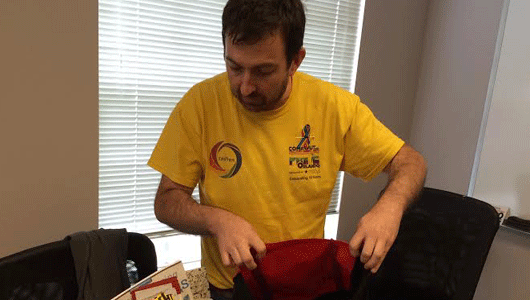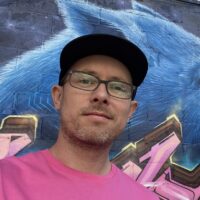
ORLANDO – The offices of the Metropolitan Business Association (MBA), Orlando’s LGBT chamber of commerce, are a beehive of activity. Couriers come and go, only minutes apart, dropping off packets full of gift cards from local restaurants, cafés, and grocery stores. Individuals arrive, knocking on the door with envelopes bulging with more vouchers. Upon arriving, all say the same thing, “Hi, I’m looking for Chris.”
The one they’re all looking for is Chris Stephenson, a vice president at MBA, and one of the many community leaders who have stepped up in the wake of the Pulse massacre. When People’s World arrived at MBA headquarters for an interview, Stephenson and other volunteers were in the midst of a three-hour blitz of gift card collection. Earlier in the day, a message had arrived from the FBI’s Victim Assistance unit saying that food and grocery vouchers were an immediate need among Pulse survivors and the victims’ families at local hospitals.
Stephenson swung into action, blasting off an email to his network of contacts and colleagues. The response was immediate. Our interview with him was repeatedly interrupted as more deliveries kept arriving. $300 of burrito cards. $60 of coffee and drink vouchers. The generosity didn’t stop flowing. As Stephenson says, it’s symbolic of the new sense of unity that has emerged in the wake of tragedy. “It shows that, as a city, Orlando is growing up.”
Anything but subdued
The gift card drive is just the latest relief activity that Stephenson’s been involved in this week. In the first hours after the shooting, he was initially just desperate for information. Albert Harris, Stephenson’s business partner and a volunteer here, contacted him at around 2:30am saying he had just driven past Pulse and saw people running out and jumping over fences as the sound of gunfire filled the air.
Beyond frantic text messages and scattered social media posts, news of what was going on inside had not yet broken. Stephenson turned on the television, but there was nothing. Local media did not begin covering the event until around 4:30 that morning. “Those two hours, not knowing what was going on, felt like two weeks.”
Stephenson describes the events of that morning in a very calm and methodical way. Tab Bish, another volunteer, looks up from his counting and sorting of Chipotle gift cards and interjects, “Chris gives a subdued account of what it was like that day, but we were not subdued.” For him, like so many others, the early hours of that Sunday were spent trying to account for friends. “I was going through my memory rolodex and started thinking of who might have been there. Then when you find that they are safe, what about the people they know? You just try to comfort them when they have nothing to do but wait.”
Once he found out the early details of what was happening, Stephenson said his mind immediately switched to grief counselling. He sent messages to five grief counsellors he knew, as well as Tim Vargas, the president of Orlando’s GLBT Center, and got them all en route to the center. “I was worried,” he said, “whether we’d be able to get all five counsellors there in time to be ready for survivors and family members.” By 11:00am, there was a line of 15 counsellors ready to offer their services. When it was all said and done, 530 counsellors had shown up.
Restoration
So what prompts the mind of a vice president of the LGBT chamber of commerce to turn to grief counselling? To answer that question, you have to look to Stephenson’s life before he joined the MBA. For eleven years, he was a criminal defense attorney. It was not the best of experiences. Seeing his clients being dumped into a punitive system that neglected any efforts at rehabilitation, Stephenson focused much of his effort on connecting them to counselling services. “I understood there was nothing the system could do or was even interested in doing for defendants.”
Even that wasn’t enough though. Some clients would question him as to why they were paying him to find them counsellors, when what they wanted was to beat their convictions – a goal he knew was often simply not possible. Eventually he told them, “You’re right. You shouldn’t be paying me.”
That’s when he decided to take a step back from the legal profession. But he carried with him a new outlook on the law and criminal reform. “Restorative justice,” he says, “is the only thing that works. Our entire legal system is off track.” The failures of American criminal justice ended up driving him out. “I just couldn’t be a lawyer any more because I had lost hope in the system.”
Today, he runs a photography business with Harris and devotes his free time to the chamber and volunteers on the board of a mental health services agency. In his LinkedIn profile, he describes himself as a “former attorney following his passion for telling stories through the lens.”
The story he is sharing us gets interrupted once again. A deliveryman arrives carrying a bag with another $2,400 of grocery store gift cards.
A new “hum” of collaboration
Stephenson says that beyond these immediate relief efforts, the focus in the LGBTQ community here – and in the wider Orlando community – has to be on keeping alive the unity forged this past week. “Long term, the focus is on collaboration,” he says. “Often each organization has its own ego and wants to grab the spotlight.”
The days that have passed since the Pulse massacre have shattered this silo approach.
“In the past, there have been bursts of collaboration, but nothing was sustained.” He’s optimistic that things might be different this time. “What’s encouraging is that there is a real hum in the community. But we know that without effort to preserve this unity, it will dissipate.”
“But there are leaders just as excited as I am about this.” On Thursday last week, there was a call for a sustained coalition of LGTBQ, Latino, Afro-Caribbean, and other diversity organizations in Orlando. “This week, I’ve made great contacts because of this unity energy. They have all experienced the same thing, and we all know that we’ve got to keep this going.”
Tab Bish feels it too: “Chris speaks as someone in the core, in the leadership, of these activities. As somebody on the ripple, I get chills. When I’m watching TV and I see inclusion… It is amazing to feel that. As a gay male, the people against us used to be so loud. Now, they are so faint.”
After returning from accepting another gift card delivery, Stephenson once again reiterates his point on unity. “It only make sense that we all collaborate. It’s got to be about how much stronger we all are when we work together.”
The last three hours of working together have paid off. A little later in the day, after People’s World departed from his office, we received a message from Chris. Over $10,000 of immediate help was raised for the Pulse survivors and victims’ families in this one afternoon.
The gift card effort was just one episode of many this week. Each of them a step toward overcoming grief, toward restoring this community, and toward finding a path to justice together.
Photo: Chris Stephenson, a vice president of MBA, unloads a fresh delivery of grocery gift cards while being interviewed by People’s World on June 17, 2016. | C.J. Atkins/PW












Comments